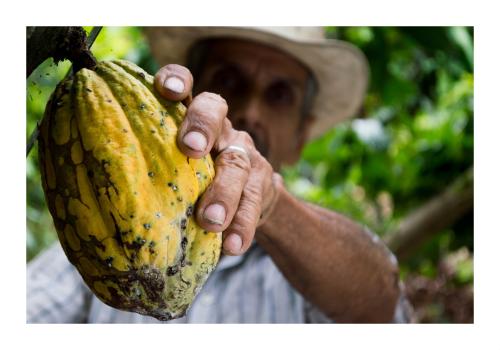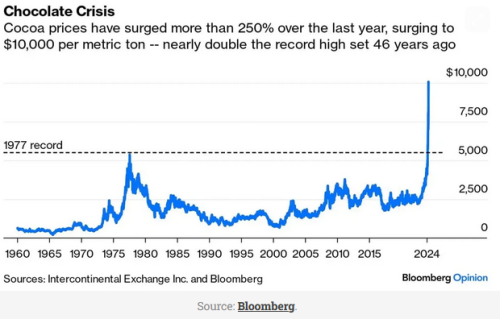Brief me on the Initiative

- In the context of the European Commission’s political priorities including the European Green Deal, the promotion ‘deforestation free’ commodities trade, and a zero tolerance approach on child labour, the Commission has initiated an informal dialogue in support of a sustainable cocoa sector, at social, economic and environmental levels.
- The objective of the dialogue is to advance responsible business practices in relation to child labour and child trafficking, the protection and restorations of forests, and decent incomes for cocoa farmers.
- This dialogue builds on the process initiated by Côte d’Ivoire and Ghana in June 2019 aiming at increasing the price of cocoa on the world market. This process led to an agreement with Traders and Cocoa Industry on the Living Income Differential, a 400USD/t premium paid on top of the price on future markets. The EU Sustainable Cocoa Initiative is based on the conviction that “prices and sustainability are the two sides of the same coin”.
- To support the initiative, the European Union will contribute €25 million to enhance the economic, social and environmental sustainability of cocoa production in Côte d'Ivoire, Ghana and Cameroon. This support is completed and scaled up by EU-funded geographic programmes. At COP28, the European Commission outlined new support measures for partner countries to ensure a successful transition to deforestation-free supply chains.
- On 28th of June 2022, following two years of discussions, all sides have committed to a set of concrete time-bound actions to improve the sustainability of the cocoa supply chain in West Africa. These actions aim to halt deforestation and child labour, and improve the living income for farmers. Focus will be put on prices and market functioning on the one hand and on traceability systems and standards on the other hand. These commitments were endorsed by all and will be closely monitored.
More information about the initiative and multi-stakeholder dialogue.
The Joint Research Centre (JRC), in cooperation with partners (The European Forest Institute, FAO and GIZ) and in coordination with the EU Delegations in Ivory Coast, Ghana and Cameroun, supports this initiative by providing a range of scientific services addressing the different dimensions of the sustainability in the cocoa sector:
- Impacts of the Living Income Differential ;
- Strengthening of capacity of producing countries to monitor deforestation;
- Contributing to the development of a traceability system for cocoa;
- Improvement of public/private standards and certifications for sustainable cocoa production;
- Conducting Life Cycle Analysis of cocoa production (from the farm to the consumer) including biodiversity impacts; More information on Cocoa Life Cycle Assessment in the African Knowledge Platform.
- Conducting field level analysis of the impact of agricultural practices in cocoa fields, including agro-forestry.
More insights on “How science can support the Sustainable Cocoa Initiative”.
Knowledge on Sustainable Cocoa
Economic Sustainability
Ensuring a living income for cocoa farmers and a fair distribution of the value generated along the chain are key aspects to be considered for the economic sustainability of the cocoa sector.
Social Sustainability
The social sustainability of the cocoa sector should be assessed against the capacity of operators in the value-chain to implement Responsible Business Conduct and eliminate child labour.
Environmental Sustainability
Ending deforestation, promoting sustainable agroforestry systems and other environmentally friendly farming techniques are key aspects to be considered for environmental sustainability of the cocoa sector…
Featured Content

The chocolate price spike: what’s happening to global cocoa production?
Global cocoa market sees steep price rise amid supply shortfall
Trade and Development Chart: Impact of the EU deforestation regulation
Farmers plant more cocoa outside Africa as prices rally
Earn a living? What the Côte d’Ivoire–Ghana cocoa living income differential might deliver on its promise
Why the Global South is against the EU's anti-deforestation law
In Africa's fields, a plan to pay fair wages for chocolate withers
Can Certified Cocoa Win on All Fronts?
Who’s going to pay for an ethical chocolate bar?
Living income in cocoa
Cocoa value chain analysis
- Cocoa value chain analysis in São Tomé e Príncipe
- Analyse de la chaîne de valeur cacao au Cameroun
- Cocoa value chain in Papua New Guinea
- Ecuador
- Nicaragua & Alto Wangki Bocay
- Colombia
- Honduras
Latest on Sustainable Cocoa from the knowledge base
| Originally Published | Last Updated | 01 Jun 2021 | 22 Apr 2024 |
| Knowledge service | Metadata | Global Food and Nutrition Security |
Share this page
